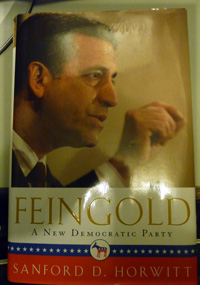By Donald H. Harrison

 SAN DIEGO— It has taken awhile to read the books presented to me by family members for Chanukah, but as it turned out, my grandson Shor’s selection of Feingold: A New Democratic Party couldn’t have been more timely. As I finished reading the biography written by Sanford D. Horwitt, I found the news wires currently filled with speculation that former Wisconsin Gov. Tommy Thompson is likely to seek the GOP nomination to oppose U.S. Senator Russ Feingold’s bid for a fourth term.
SAN DIEGO— It has taken awhile to read the books presented to me by family members for Chanukah, but as it turned out, my grandson Shor’s selection of Feingold: A New Democratic Party couldn’t have been more timely. As I finished reading the biography written by Sanford D. Horwitt, I found the news wires currently filled with speculation that former Wisconsin Gov. Tommy Thompson is likely to seek the GOP nomination to oppose U.S. Senator Russ Feingold’s bid for a fourth term.
Thomson, who also served as Health and Human Services Secretary under President George W. Bush, would be likely to make the health care bill recently passed by congressional Democrats and signed into law by President Barack Obama a major campaign issue, potentially providing a Wisconsin-wide referendum on that controversial measure.
Feingold, who is one of more than a minyan of Jewish senators, is a Democrat with a reputation for being a political maverick. Along with Senator John McCain (Republican-Arizona), he successfully pushed for a campaign finance reform bill that brought both men national recognition and fueled McCain’s successful bid for the 2008 Republican presidential nomination.
Although he’s a Democrat, Feingold grew up idolizing “Fighting Bob” LaFollette, who shaped the Progressive Republican movement in the early 20th century. In high school, Feingold was a star debater. At the University of Wisconsin, he missed a straight A average because of one ‘B+,’ for which he apologized to his professor, but even so, his grades were sufficient for admission to Phi Beta Kappa. He was selected as a Rhodes Scholar, spending two years in Great Britain, and later earned a law degree from Harvard Law School. He practiced a short while as an attorney in Wisconsin before feeling the pull of elective politics, winning an upset victory in 1982 against incumbent Cy Bidwell in a bid for a state Senate seat.
In his decade in the Legislature, Feingold developed a reputation as an advocate for senior citizens and for small dairy farmers. His campaign to label milk of genetically altered cows stirred the opposition of Monsanto Company and other bioengineering companies but notwithstanding large amounts of lobbying money they put into defeating the bill, Feingold prevailed.
Feingold was considered a long shot in the 1992 Democratic primary race for the U.S. Senate, in which two wealthy opponents, businessman Joe Checota and Congressman Jim Moody, had the financial resources and the name recognition. But Checota’s and Moody’s campaigns degenerated into a series of negative commercials slamming each other, while Feingold stayed out of the fray. Instead Feingold promoted his own candidacy with humorous, folksy ‘home movies’ in which he burnished his populist credentials by showing his modest home and the exteriors of the more elaborate homes of his ‘big-money’ opponents.
Unhappy with Checota’s and Moody’s feuding, Wisconsin Democrats chose Feingold to oppose U.S. Sen. Robert Kasten in an all-Jewish runoff. Staying true to his upbeat campaign style, Feingold survived a barrage of negative commercials aimed against him by Kasten and his allies and, at 39, entered the U.S. Senate as its youngest member.
Almost immediately, Feingold directed his staff not to allow anyone to purchase their meals for them, nor to accept any other gifts, setting a standard for propriety in the nation’s Capitol.
Besides by the McCain-Feingold Bill on campaign financing, Feingold’s reputation as a maverick was further enhanced in 1999 when Senator Robert Byrd of West Virginia moved to dismiss the impeachment charges against President Bill Clinton. Feingold was the only Democrat to vote to keep the trial going, joining 55 Republicans. He said that he believed the trial needed to continue to a conclusion. Yet, when the final vote came—on conviction or acquittal—Feingold voted for acquittal with his fellow Democrats.
On two other important votes, Feingold also developed a reputation as an independent thinker. One was his vote against the Patriot Act, which he considered to be a constitutional infringement on the rights of Americans under the guise of protecting the country against terrorism. The other was a vote against authorization of the War in Iraq.
Whether a liberal independent like Feingold will be able to survive a challenge in the middle of President Obama’s first term obviously was beyond the scope of this biography, which was published at the end of 2007. But as background for any Wisconsin voters who do not already know Feingold—or for those of us in other parts of the country—this book is well worth reading.
*
Harrison is editor of San Diego Jewish World